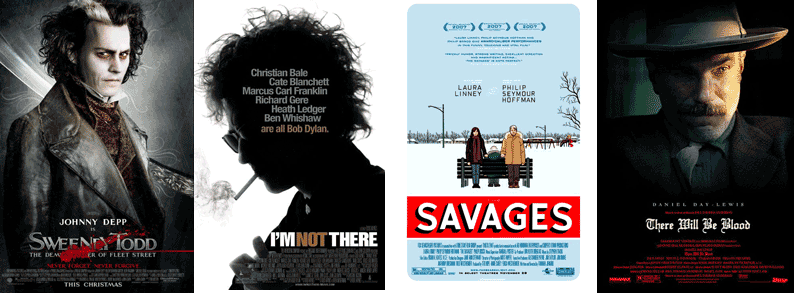“Atonement”-I read and disliked Ian McEwan’s book upon which this movie was based. And so I came to it somewhat prejudiced. But I tried to view it as objectively as possible. It begins brilliantly in England in 1935. With the pounding sounds of a typewriter in the background, a hint at the theme of the film, we view a large country manor at which Mrs. Tallis (Harriet Walter) and her two daughters, Cecilia (Keira Knightley) and Briony (Saoirse Ronan), are entertaining friends and relatives, including the young and restless Quincey cousins, Pierrot, Jackson, and Lola, who are there because of the marital problems of their parents, as well as the somewhat unsettling Paul Marshall (Benedict Cumberbatch). On the day of a planned dinner paty, Briony, age 13, a fledgling playwright, observes events (innocent and not so innocent) and snoops where it is none of her business, without understanding what’s really going on, especially between her sister, Cecilia and her love interest, Robbie Turner (James McAvoy), the housekeeper’s son who was given an education by Mr. Tallis. In one fatal moment, after viewing what she sees as a rape, Briony makes an accusation of a crime that will change the lives of both Cecilia and Robbie. “Atonement” then suddenly moves forward to the beginning of WW II, but unfortunately begins to resort to the current overdone movie cliché of jumping back and forth in time with labels such as “four years later,” “three weeks earlier,” etc. The result is a mishmash which somehow manages to convey Robbie’s experiences at Dunkirk and his ultimate reunion with Cecilia. Briony, originally played with intensity by young Saoirse Ronan, an Oscar nominee, is played by Romola Garai at age 18 and, later, by Vanessa Redgrave as an old woman, and the viewer should take note of the rather unlikely fact that Briony seems to have the same hairdo throughout. At long last, the older version of Briony reveals a secret that exposes the melodramatic nature of the entire affair. James McAvoy (“Becoming Jane”), who seems on the verge of being as overexposed as Jude Law was a few years ago, does a fine job as Robbie whose life seems to be beyond his own control. Keira Knightley, looking far too thin, is barely able to provide the facial expressions that convey her character’s mood of the moment. “Atonement” was nominated for an Oscar. In my humble opinion, there were other more deserving films. B (3/22/08) “In the Shadow of the Moon”-I thought I’d seen just about everything there was to see about the United States’ moon landing program, including the actual landing, live on TV, in 1969, Ron Howard’s “Apollo 13,” and the incredible HBO series, “From the Earth to the Moon.” Presented by Ron Howard and directed by David Sington, “In the Shadow of the Moon” does provide something new in the form of a documentary about the men who actually went to the moon. Although Neil Armstrong, who is known to value his privacy, doesn’t take part, his presence is felt through the comments, observations, and humor of other moon-program astronauts, including Alan Bean, Mike Collins, Eugene Cernan, Charles Duke, Harrison Schmitt, and James Lovell. What is most revealing is that even these men, who actually traveled a quarter of a million miles through space and are the only humans to have landed on a foreign body, seem in awe of what they did. It’s sad that it was necessary, but during the closing titles, the astronauts make comments about the allegations of a moon-landing hoax. The most telling response? That if it was a hoax, why did they do it nine times? B+ (3/21/08) | |









